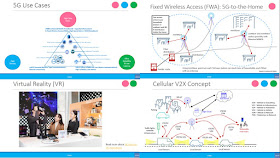I recently did another 5G training for CW (Cambridge Wireless) & UK5G. One of the sections in that was about Use Cases. A very common questions that people ask is what can 5G do that 4G can't. The answer frankly is sometimes not very straightforward.
#5G teacher extraordinaire @zahidtg from @Parallel_tw is back in action today with his popular #CWTechTrain "An Advanced Introduction to 5G". Spaces are still available for CW's next training day on #IoT (29 May) - find out more here: https://t.co/FBMECW88ge pic.twitter.com/DtMqttefg1— Cambridge Wireless (@cambwireless) May 2, 2019
While you can get a very high speed and very reasonable latency 4G system, it's not necessarily a commonplace. Similarly 5G is a bit over-hyped. There is a lot of potential in the technology but the theory may not translate into practice. Take for example millimeter wave. There is a large amount of bandwidth that can be available to each operator in this spectrum. The laws of physics however restrict how far mmWave can travel and also the fact that mmWave does not penetrate through glass, walls, etc. Does that mean that an indoor 5G system would be required to complement an outdoor one? Would Wi-Fi be able to complement cellular in-building? There are many unanswered questions at the moment.
There is also the debate around 5G icon displayed on your smartphones. When you see 5G, would it really be 5G or just re-branded 4G? Light Reading has explained this issue nicely here.
So while there are many potential applications & use cases that will benefit from 5G in the long run, the answers are not that easily available today. Anyhow, the collection of videos and slides embedded below will provide you with an insight on how different vendors and operators are looking at potentially using 5G.
The latest version of these slides are available to download from UK5G website here.

No comments:
Post a Comment